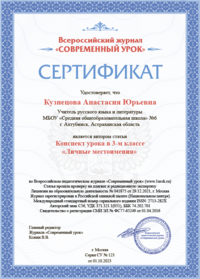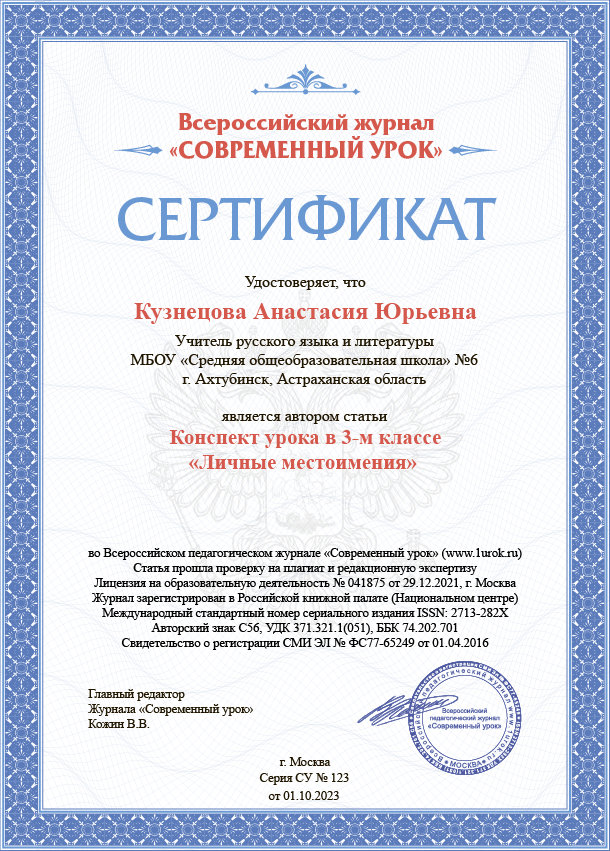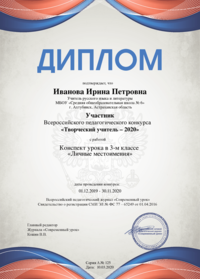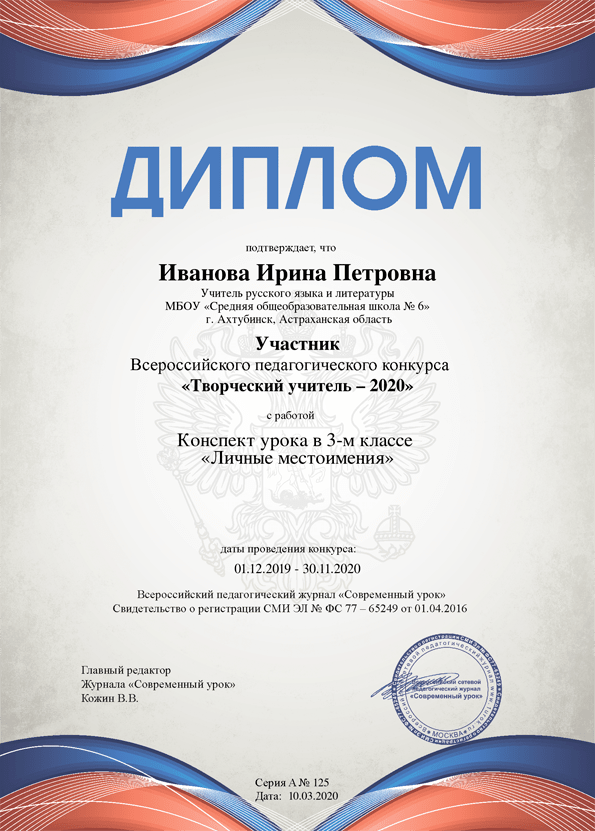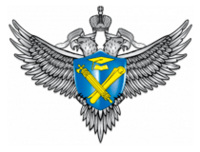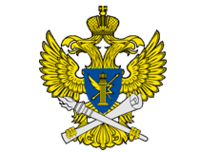The world where I live
Автор: Уварова Диана Наильевна
Организация: МБОУ «Лицей №4»
Населенный пункт: Республика Мордовия, г.Рузаевка
по теме «The world where I live»
Тип урока: Урок-повторение
Образовательная цель: актуализировать лексические и фонетические навыки;
Развивающая цель: развивать навыки аудирования, навыки чтения;
Коммуникативная цель: учить вести диалог, тренировать навыки диалогической речи;
Обучающая цель: обучать осуществлять проектную деятельность;
Воспитательная цель: воспитывать уважительное отношение к родному городу, стране и стране изучаемого языка, формировать познавательный интерес к культуре другой страны.
Оборудование: Power Point презентация по теме, компьютер, проектор, рабочие листы с заданиями.
Ход урока:
|
Этап урока |
Действия учителя |
Деятельность учащихся |
УУД |
5.Развитие навыка воспринимать информацию на слух. Аудирование.
8. Развитие диалогической речи. Работа в паре.
9. Проектная деятельность.
10. Формирование познавательного интереса к культуре другой страны (страноведческий аспект).
11. Заключительный этап. Рефлексия. Подведение итогов.
|
Милое солнышко Ярче нам свети Нам сегодня солнышко Вместе по пути. Good morning boys and girls. Look at the window. What a nice weather today! I hope our lesson will be nice, useful and interesting. Oh, sorry, I have a call. It is from British boys and girls. They want you to answer some questions. 1«Hello friends! How are you?
It will be interesting to know more about the place where you live. Thank you dear friends. Hold the line, please.
Children, I have a nice Russian poem for you. Listen to me please. «Нет ближе и дороже той земли, Где ты в один прекрасный день родился, Где корни жизни ты пустил свои И чем-то нужным людям пригодился. Взгляни на глобус: вот он шар земной На нем Рузаевка с березовый листок величиной Всего лишь навсего не больше обыкновенного листа….» Children, did you like the poem? So, children after our call and my poem can you guess the theme of our lesson? Yes, you are right. Today we speak about our town Ruzaevka. And our lesson is called “The place where I live”.
Let’s revise some sounds and words. We need them during our lesson. So, repeat after me, please. [i]-city, country, live, animal, cinema, river [o]-shop, hospital, domestic, fox, dog [a:]-park, garden, farm [i:]-clean, sheep, people, field [u:]-school, pool, wood [ai]-ice, sights, wild, kind [ei]-railway men [^]-London, republic, country, some, Russia
a) Now I want to see how you can use some of these words in practice. Look at the slide, please. Your task is to read the sentences and name the words instead of the pictures.
b) Children look at these animals (a dog, a cat, a fox) they live in our republic. They are domestic and wild animals. I have a surprise for you. It is a game. I hope you like to play games (интерактивная игра со словами).
We continue talking about our town. In our town there are many different places to go. Listen to the 5 riddles about our sights and write down your answers in the blanks. Be attentively there is an odd answer.
(A-school, B-hospital, C-park, D-shop, E- ice palace, F-café)
We live in a nice town Ruzaevka where the houses are not big. But some people live in the city Where the houses are very tall Some people live in the country Where the houses are very small But in the country where the houses are small The gardens are very big And in the cities where the houses are tall There are no gardens at all. Now after such a nice poem it’s time to read the text about our town. Text. Ruzaevka is a beautiful town. It is not big, but nice and clean. It is an old town. There are shops, schools, hospitals, a park, an Ice palace and a Swimming Pool in Ruzaevka. Around our town there are green fields, woods, forests and rivers. In the woods and forests live a lot of animals and birds. People in Ruzaevka are kind and friendly. They like their town very much. Let’s do the task-say “True or False”.
Now it’s time to rest. Clap, clap, clap your hands, Clap your hands together. Touch, touch, touch your ears, And touch your ears together. Touch, touch, touch your cheeks, and touch your cheeks together. Shake, shake, shake your hands, and shake your hands together. Smile, smile with your friends, Let us smile together.
Children, imagine that your British friends will visit us. Let’s act dialogues.
B. My name is….Nice to meet you. A. Where are you from? B. I am from Britain. My city is London. And where are you from? A. I’m from Russia. My town is Ruzaevka.
Children let’s make a small project about our town. There are sentences about Ruzaevka on your decks. And I have pictures about our town. I’ll show you the picture and you find the best sentence and read it.
Оh, children our guests are on the line again. They want to tell you about their city-London. Let’s watch and listen to them. (Дети рассказывают по скайпу о Лондоне).Thank you friends. It was very interesting. Children would you like to go to London? I hope you’ll visit it someday.
Today we saw that people live in different places and countries. We all so different, but we live in one big planet-the Earth. And there is no place like home. Our lesson is coming to the end. I hope you like our lesson. Our planet is so nice and the sun shines for everyone. I want to draw the sun and you’ll draw the yellow rays, if you like our lesson and the red rays if you don’t like it. And enjoy listening to the song «Солнечный круг». So, our lesson is over. Good bye. |
Учащиеся прослушивают стихотворения и приветствуют учителя.
Учащиеся отвечают на вопросы, задаваемые им по скайпу.
Учащиеся прослушивают стихотворение на русском языке.
Учащиеся выражают свое мнение об услышанном стихотворении.
Учащиеся повторяют звуки и слова хором за учителем.
Учащиеся зачитывают предложения, используя вместо картинок слова.
Учащиеся играют в игру, используя интерактивную доску.
Учащиеся прослушивают загадки и заносят свои ответы в готовые бланки.
Учащиеся прослушивают стихотворение на английском языке.
Учащиеся читают текст о родном городе.
Учащиеся выполняют задание после прочитанного текста.
Учащиеся отдыхают под динамическую паузу.
Учащиеся разыгрывают диалоги.
Учащиеся находят предложения к картинкам на слайдах и зачитывают свои предложения.
Учащиеся прослушивают информацию о Лондоне и просматривают слайды о достопримечательностях Лондона.
Учащиеся отвечают на вопрос учителя.
Учащиеся выражают свое отношение к уроку, рисуя лучи к солнцу.
Учащиеся прощаются с учителем.
|
1.Формируют умение реагировать на реплики учителя. 2.Формируют волевую саморегуляцию и умение настроить себя к работе на уроке.
1.Формируют умение отвечать на вопросы по скайпу.
1.Формируют мотивацию постановки учебной задачи.
1.Формируют умение выражать свое мнение об услышанном стихотворении.
2.Определяют тему урока.
1.Тренируют произношение звуков и слов.
1.Учатся употреблять слова вместо картинок в упражнении.
1.Учатся определять домашних и диких животных в увлекательной игре.
1.Формируют умение воспринимать информацию на слух.
1.Формируют умение понимать услышанную информацию.
1.Тренируют навыки чтения.
1.Формируют умение определять правильность информации по прочитанному тексту.
1.Учатся работать в парах, формируют навыки диалогической речи.
1.Учатся определять нужные предложения к увиденным картинкам; 2.Формируют уважительное отношение к родному городу; 3.Формируют познавательный интерес.
1.Формируют уважительное отношение и познавательный интерес к культуре другого языка.
1. Выражают свое отношение к уроку. |

 БЕСПЛАТНЫЕ семинары
БЕСПЛАТНЫЕ семинары